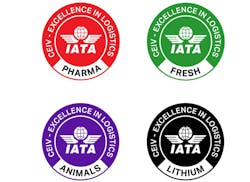
This article is part of a series explaining the various types of IATA CEIV certifications.
While the primary focus of certifications from Center of Excellence for Independent Validators is on the transportation of special cargo and lithium batteries shipments, the International Air Transport Association (IATA) certification portfolio also includes safety, security, operation, cargo, environment and sustainability and training programs.
In the area of environment and sustainability, IATA has the IATA Environmental Assessment (IEnvA) Program. IEnvA is a certification program, developed to independently assess the commitment of aviation stakeholders such as airlines, airports, cargo handling facilities, freight forwarders and ramp handlers, to continuously improve their environmental and sustainability performance. IEnvA is based on globally recognized standards and industry best practices, including the ISO 14001 environmental management system standard and the IATA Operational Safety Audit (IOSA).
IATA is actively developing comprehensive standards that span the broad spectrum of sustainability. These include initiatives for supply chain sustainability, the establishment of key environmental, social and governance (ESG) performance indicators, and the enhancement of corporate social performance. Yaniv Sorany, principal, IATA Certification, says these efforts are aimed at not only addressing the immediate environmental challenges but also at ensuring long-term sustainability, while empowering organizations to accurately measure and track their sustainability performance across expertly selected key performance indicators that cover the full ESG spectrum and align with prominent ESG Raters and Reporting Frameworks.
In the area of training, the Competency-Based Training and Assessment Center Program (CBTA Center) is the global certification program on certifying organizations for compliance with the training provisions in accordance with competency-based training and assessment approach. The CBTA Center provides organizations the opportunity to acquire accreditation from IATA, attesting that their training is validated against the IATA CBTA Center program’s policy, standards and requirements. Three types of accreditations are possible through IATA’s CBTA Centers program: CBTA Corporate, CBTA Provider and CBTA Excellence. Currently, more than 200 CBTA Centers are distributed in 65 countries and every year train approximately 75,000 students within this growing network.
With the adoption of CBTA for other job functions, Sorany says IATA is studying the market to expand the CBTA Center to cover all aviation operational related training in the area of cargo, ground operation and general aviation safety and provide greater support to the expected growth of the aviation workforce.
About the Author
Rebecca Kanable
Assistant Editor
Rebecca Kanable, a veteran journalist, worked with Endeavor Business Media's aviation group from 2021 to 2024 as assistant editor of Airport Business, AMT and Ground Support Worldwide. She previously worked for various publications, including trade magazines and newspapers.
